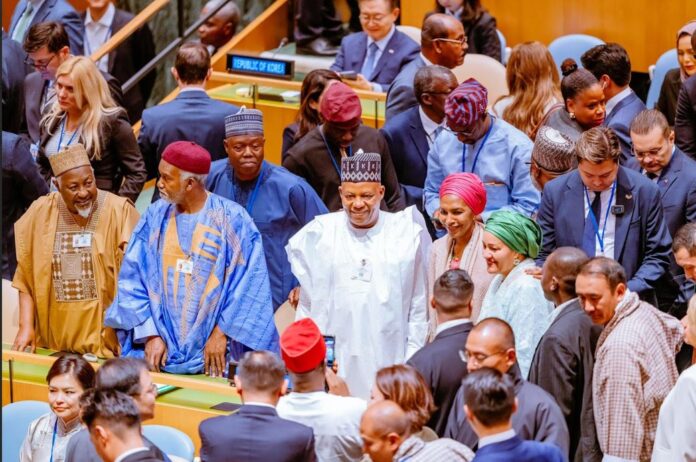UNGA 79: Tinubu calls for debt forgiveness for Nigeria, others
President Bola Tinubu has urged world leaders to prioritize debt forgiveness for Nigeria and other developing nations from creditors and multilateral financial institutions.
He also called on the United Nations to enhance multilateralism by strengthening relationships among member states, emphasizing the principles of inclusivity, equality, and cooperation.
Tinubu, who chairs the Authority of Heads of State and Government of the Economic Community of West African States, made this appeal during his address to global leaders at the General Debate of the 79th Session of the United Nations General Assembly at the UN headquarters in New York.
Represented by Vice President Kashim Shettima at the high-level annual global event, President Tinubu emphasized that countries in the Global South cannot achieve meaningful economic progress without special concessions and a reassessment of their current debt burdens.
READ ALSO: UNGA79: Nigeria advocates for UN Security Council seat, citing 200,000 troops in 41 missions
In a statement released to the press by Stanley Nkwocha, Senior Special Assistant to the President on Media and Communications (Office of the Vice President), Tinubu highlighted the global debt crisis that hampers governments’ ability to meet citizens’ needs. He pointed to trade barriers and protectionist policies that stifle hope for development, as well as intense competition that discourages motivation and hinders global investment.
According to the Debt Management Office’s Q1 2024 report, Nigeria’s total domestic and external debts amount to N121.67 trillion ($91.46 billion).
In the first half of 2024, Nigerian states saw a 122% increase in external debt servicing, rising to N139.92 billion from N63.06 billion in 2023.
The increase in debt servicing costs is attributed to rising borrowing expenses amid currency depreciation, which has significantly affected subnational spending and fiscal health.
Kaduna and Lagos states have the highest external debt servicing costs, while several other states are seeking relief from escalating repayment obligations.
Commenting on the debt burden, Tinubu stated, “We must ensure that any reform of the international financial system includes comprehensive debt relief measures to facilitate sustainable financing for development.”
“Countries of the global South cannot make meaningful economic progress without special concessions and a review of their current debt burden,” he stated.
Tinubu called for the recovery of proceeds of corruption and illicit financial flows, stating that the return of such funds to countries of origin “is a fundamental principle of the United Nations Convention against Corruption.
“Therefore, the international community must promote practical measures to strengthen international cooperation to recover and return stolen assets and to eradicate safe havens that facilitate illicit flows of funds from developing countries to the developed economies.”
The President decried the steep descent to singularity and nationalism which, according to him, were undermining the quest for peaceful and collective resolution of global challenges such as terrorism, climate change, poverty, food crises, hyper-inflation, nuclear proliferation and grinding debt burden, among others.
The Nigerian leader reminded the world leaders that the United Nations stood for multilateralism which represented inclusiveness, anchored on the tripod of peace, sustainable development and human rights.
He expressed worry about the main objectives of the UN and how it could sustain the global body’s relevance and resilience, noting that the pillars of the organisation are at risk of being broken against the principles of inclusivity, equality and cooperation.
“Today, these pillars of our organisation are threatened. They risk being broken by the relentless pursuit of individual national priorities rather than the collective needs of the nations that are assembled here today.
“While commitment to multilateralism offers us the surest guarantee of global action to address the existential challenges we face, singularity and nationalism are undermining the aspirations towards the peaceful and collective resolution of such challenges.
“From last year’s summit, and indeed from previous years, we have carried over the numerous challenges of terrorism, armed conflict, inequality, poverty, racial discrimination, human rights abuses, food crises, hunger, irregular migration, piracy, global pandemics, hyper-inflation, nuclear proliferation, grinding debt burden, climate change, and a host of other vexations.
“The continued manifestation of these challenges testifies to our failings rather than to any lofty achievements on our part. Billions of dollars are being committed to the prosecution of wars and the fanning of the embers of conflict,” he said.
Tinubu reaffirmed what he termed “Nigeria’s steadfast commitment to the deepening of multilateralism,” just as it did 65 years ago when it joined the United Nations as the 99th member-state.
“We remain committed to that desire to remain friendly with all nations and participate actively in the works of the United Nations, as expressed by our founding Prime Minister, Sir Abubakar Tafawa Balewa,” he said.
Proofreading by Uchechi Ojo, Sub-editor at Neptune Prime.
Follow the Neptune Prime channel on WhatsApp: https://whatsapp.com/channel/0029Va74ZvU2v1IqKByXoX3d
Do you have breaking news, interview request, opinion, suggestion, or want your event covered? Email us at neptuneprime2233@gmail.com
Follow the Neptune Prime channel on WhatsApp: https://whatsapp.com/channel/0029Va74ZvU2v1IqKByXoX3d
Do you have breaking news, interview request, opinion, suggestion, or want your event covered? Email us at neptuneprime2233@gmail.com


